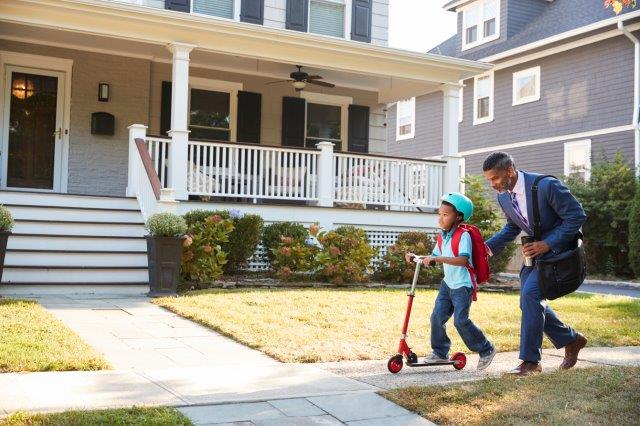Owning your home is the most common and well-known real estate investment. You don’t get cash flow from tenants but you make money from the appreciation of your home when it is sold it in the future.
🏠 More: Explore rental properties for sale – tenants and cashflow included!
Overview
- Up-Front Investment: Down payment usually 10% to 20% of home’s price.
- On-Going Investment: Monthly mortgage payment.
- Return on investment: Most mortgages last 15 to 30 years, but you can sell early if the market’s hot.
- Best for: A person who can afford to own their own home and sees a strong market in the local area.
How It Works
You probably wouldn’t see owning a home as much of a real estate investment, but it’s actually a great opportunity to get into a hot real estate market while benefiting from it personally.
If you own your own home, it also opens doors for renting out a spare room on AirBnB (short-term rentals) or even renting out on a longer-term basis if you have a mother-in-law suite or guest area (or a basement that you can convert into such).
The great thing about buying a home for yourself is that you’ll likely qualify for FHA or another loan program. If the home is going to be your primary residence, you can get started with as little as 3.5% down. If the local real estate market is warming up, this is the perfect opportunity to buy in and expect your investment to appreciate in value.
When buying a home for yourself, you’ll get the chance to maintain and update it to your liking while also having the opportunity to perhaps get an older home and fix it up so it increases in value. If you want to really add to your investment, you’ll find a property that you see a lot of potential for (especially in location) and then add equity to it through upgrades and projects over the years.
Mortgages
Most mortgages are going to lock you in for 15 or 30 years. This can be scary, and no on can predict the future, but the hope is that your home will continue going up in value over time as the area grows and more people move in.
If you can score a house in an up-and-coming location and/or a home with a larger-than-average lot, these are things that will certainly pay off in the long run (even if the home itself needs some work).
For the price of a small pizza, EarnUp can help you pay off your mortgage faster and stabilize your cashflow.* Calculate your savings now.While you aren’t going to be earning dividends or monthly rent from tenants by owning your own home, this is a long-term investment strategy that can work out well in the long run.
If you buy a home today and, in seven years, the prices have increased 20%, that’s probably enough already for you to sell for a profit and pay your mortgage off early (and then move on to another investment).
You can also treat a home purchase as a long-term investment that you’re just going to sit on for a while. There’s nothing wrong with staying in your home for the full 15 or 30 year term and paying it off in full, especially if you have fallen in love with it. In fact, that would be ideal, and then you’d have something to put in your estate for the entire family to benefit from.
In the meantime, the shorter-term returns that you can expect from owning your own home relate directly to your financial health. First and foremost, by owning your own home and paying your mortgage on time, banks are going to see that you are a trusted borrower. You’ll be raising your credit score with time, and all of this will mean a higher chance of getting approved for a secondary loan (like if you choose to purchase an investment property).
You can also rent out any extra space for a reasonable price, and if you price it correctly and you’re in the right area, the renters might be enough to cover your monthly mortgage while even leaving a bit of money to spare.
It may not be enough profit to live off of, but it’s a fantastic way to dip your toe in the water, learn more about being a landlord, and be working towards a stronger credit score in the meantime. Plus, this money can be put into savings as you prepare to buy a secondary investment property, if you so choose.

The Pros
Owning your own home is a fantastic way to learn more about the buying/selling process and even get into AirBnB or long-term room rentals. Investing into your home by upgrading it over the years will add equity, thus allowing you to get more out in the long-term if you go to sell your house.
Paying your mortgage on time each month will also equate to a stronger credit profile and a better chance of borrowing again (at a potentially lower interest rate) in the future.
The Cons
If you aren’t ready for a monthly mortgage payment or if you don’t have the minimum required to buy your own home, you won’t be able to pursue this investment strategy. However, when you consider the cost of monthly rent, you might be able to squeeze in a mortgage in its place.
Summary
Owning your own home may not seem like a real estate investment at first glance, but it’s actually a fantastic way to catch the real estate bug while learning more about buying, selling, and even being a landlord yourself.
With the options for short term rentals or even a long-term lease of spare space, you can turn your primary residence into a monthly profit.
Read Next: There’s no better time to buy a home. Our First Time Home Buyer’s Guide will help you avoid mistake and find your dream home
🏠 More: Explore rental properties for sale – tenants and cashflow included!


